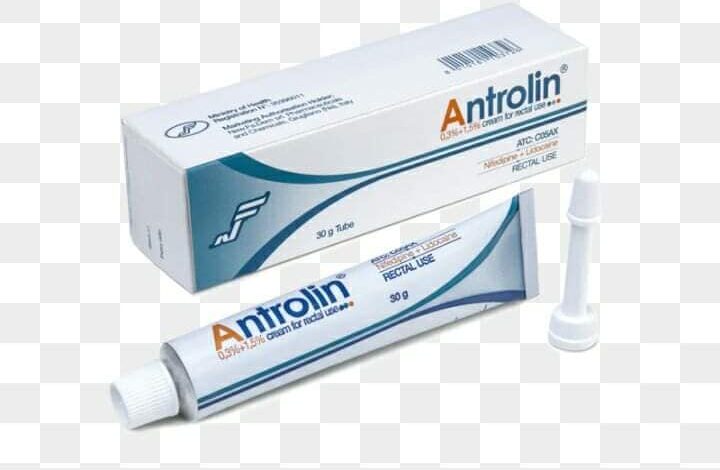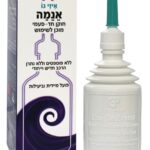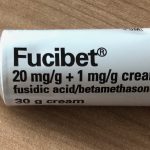Antrolin Cream: Uses, Side Effects, Composition, Warning

What is Antrolin Cream?
Antrolin is an Italian made cream containing lidocaine hydrochloride (a derivative of Lidocaine) that is used to numb an area of your body to help reduce pain or discomfort and nifedipine, dihydropyridine with calcium- antagonist action which, when used locally, has a relaxing effect on peripheral smooth muscle and can reduce the tone of the internal anal sphincter.
Antrolin is used for the treatment of anal fissure and proctalgia generally associated with anal sphincter hypertonus. Proctalgia refers to the sudden onset of severe pain in the rectum area, which can last from seconds to minutes. The pain is sporadic and can be without warning. The condition is also known as functional recurrent anorectal pain. It is part of a group of disorders that affect the workings of the stomach and intestine.
When Antrolin should not be used
- Hypersensitivity to the active ingredients and in particular to lidocaine (and other local anesthetics with a similar structure of the amide type) or to any of the excipients.
- Known or suspected pregnancy and lactation (see also “Special warnings”).
- Severe hypotensive states and cardiovascular insufficiency.
What you need to know before using Antrolin
During the clinical trial, no undesirable effects resulting from possible systemic absorption of the drug were reported. Antrolin rectal cream must however be used with extreme caution in patients who have severely damaged mucous membranes and inflammation in the region to be treated, as in such situations there could be an excessive absorption of the active ingredients. Furthermore, the medicine should be used with caution in diabetic patients or in those with severe hepatic and / or renal insufficiency.
Treatment with Antrolin rectal cream should be under medical supervision in very elderly patients, as well as in those under the age of 18 and in patients being treated with beta-blocking or antihypertensive drugs .
It is advisable to check blood pressure at the beginning and periodically during treatment. In case of failure of the therapy (absence of improvement or worsening of the symptoms) it is necessary to suspend the treatment and consult the doctor for other measures.
How to use Antrolin cream
For endorectal and perianal applications: Apply the cream 2 times a day for at least three weeks.
Method of administration
- Lie down on the bed on the left side;
- unscrew the cap from the tube and screw the cannula into it, let out a small amount of cream to lubricate the cannula and insert it into the anus;
- press the end of the tube, let out the cream contained in about one centimeter of the tube (one centimeter of the tube contains about 2.5 – 3 g of cream).
What to do if you have taken an overdose of Antrolin
There have been no reports of systemic toxicity from overdose after topical application of Antrolin rectal cream. In the event of intoxication after topical application of the product, the systemic effects should be similar to those induced by the active ingredients with other routes of administration .
In cases of severe Nifedipine intoxication, disturbances of consciousness up to coma, drop in blood pressure and altered heart rhythm and cardiogenic shock may occur. As for the treatment, beta- sympathomimetics can be used for bradycardic heart rhythm disturbances and, in case of severe hypotension, calcium gluconate (10-20ml of 10% solution slowly intravenously ) and possibly dopamine or noradrenaline.
Most of the toxic reactions to local anesthetics and lidocaine in humans involve the CNS; there is a sensation of “light head” and dizziness, often followed by visual and auditory disturbances, such as accommodation difficulties and tinnitus and in the most severe cases, CNS depression and convulsions.
What are the side effects of Antrolin cream?
Reactions such as pain, burning, itching , hyperemia and bleeding may occur locally . These effects subside after discontinuation of treatment. In very rare cases, local application of lidocaine preparations caused allergic reactions (in severe cases anaphylactic shock .
During the clinical trial phase, no undesirable effects due to possible systemic absorption of the two active ingredients ( headache, dizziness, peripheral vasodilation, hypotension, dizziness and tremors ) were highlighted.
Notify your doctor or pharmacist of any undesirable effects that are not described or cannot be explained here.
Which drugs or foods can change the effect of Antrolin?
Due to the presence of nifedipine, the effect of antihypertensive drugs could be enhanced by the use of Antrolin rectal cream. The propranolol prolongs plasma half-life of lidocaine and increases plasma levels of nifedipine. The cimetidine may increase the plasma levels of lidocaine and nifedipine. The simultaneous administration of Antrolin rectal cream in patients being treated with digoxin may lead to increased plasma levels of digoxin.
Can I use Antrolin cream during pregnancy and breastfeeding?
No, Antrolin cream should NOT be used during pregnancy or breastfeeding. Nifedipine and lidocaine cross the placental barrier and are excreted in breast milk . In studies in rats and rabbits, nifedipine was shown to cause teratogenic effects. Lidocaine did not highlight any risks to the fetus. However, it is recommended not to use the product in pregnant and lactating women.
Warnings related to some excipients present in the medicinal product
Antrolin rectal cream contains sodium methyl p-hydroxybenzoate and propyl p-hydroxybenzoate which can cause allergic reactions, even delayed. In addition, ANTROLIN rectal cream contains propylene glycol and alcohol cetostearyl that can cause local reactions of the skin (eg contact dermatitis).
Warnings
Topical application of the drug in excessive doses and / or for prolonged periods of time can give rise to sensitization phenomena and local reactions of hyperemia and bleeding, which disappear when treatment is suspended.





